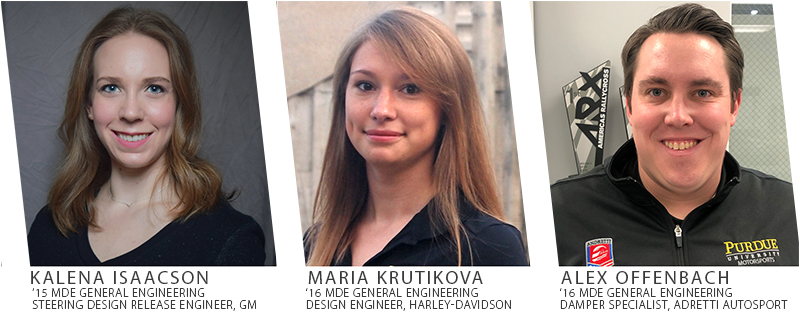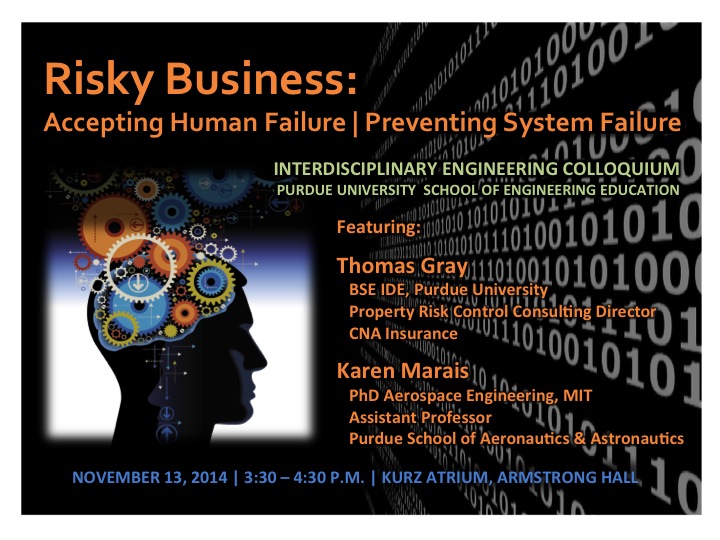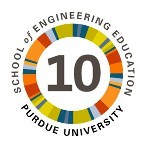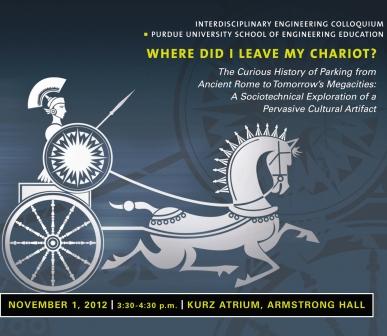Interdisciplinary Engineering Colloquium
This annual colloquium, inspired by the School of Engineering Education's boundary-crossing Interdisciplinary Engineering (IDE) program, presents a topical subject and invites perspectives from engineering and a range of other fields, including the humanities, the social sciences, and education. Drawing speakers from our diverse alumni base, the event highlights the enormous potential of our school to work with industry. Our core research expertise is about engineering learning—expertise that is central to creating a more innovative technical workforce. We look forward to involving IDE alumni in this exciting work.
Supported by the PROFESSOR BRUCE JOHNSON GRADUATE EDUCATION FUND.
2020: Bumper to Bumper Engineering
Multidisciplinary Engineering in the Automotive Industry
January 16, 2020
3:30 - 4:20 PM
Neil Armstrong Hall of Engineering, Kurz Atrium
This year's panel are all recent alumni/ae with two things in common - they are graduates of the Multidisciplinary Engineering program (MDE), in the automotive industry, engineering the future of transportation bumper to bumper.
In this panel discussion, we will learn about the roles MDE alumni fill in the safe and high-performance vehicle development we see in the market place of today and beyond. Moderated by their former professor and mentor Dr. Mary Pilotte, Director of Engineering Education Undergraduate Degree Programs, we will explore the beneficial skill set, professional choices, and lessons learned for those with job responsibilities of internal and external vehicle functionality addressed by visual design engineers, and how leadership roles working with the top automotive manufacturing and distribution centers deliver excellent results with general engineering alumni/ae.
Meet Our Panelists

The colloquium is open to the general public. The panel discussion will be live-streamed (link TBA) and archived for on-demand viewing. We encourage attendance of students and faculty interested in the skills desired for the automotive industry as well as experiences for recently transitioned engineers from Purdue to industry.
2017: "We are All Human"
A Firm Foundation for Humanitarian Engineering
On November 9, 2017, Purdue University College of Engineering Faculty Panelists Jennifer DeBoer, Brent Jesiek, and Ayhan Irfanoglu discussed the nature of humanitarian engineering across engineering design initiatives, emerging economies, and as global competencies and challenges.
For the first time at Purdue University, this fall students have the opportunity to major in Humanitarian Engineering through the School of Engineering Education’s Interdisciplinary Engineering Degree Program. This new accredited plan of study joins other well-known universities, who together have built the institutional stage for this emerging field. With Purdue’s deep roots and long history of humanitarian work through university-wide initiatives, the new humanitarian engineering plan of study already stands on a firm foundation. Through study abroad and research efforts, Purdue Engineering faculty and students have traveled the globe. It is across these travels that we begin to observe and consider the humanistic challenges that exist globally and in our home communities. Humanitarian engineering is a growing field, one needed more now than ever before. Explained best by one student returning from a study abroad experience in Turkey, “For the first time, I understood what it means when people say, ‘we are all human’.”
2016: The Art of Collaborative Scholarship
On the Flip Side of the Stage: Acoustical and Theatre Engineering
Collaboration between the Colleges of Engineering and Liberal Arts began with just one student* graduating with an interdisciplinary engineering degree in 1975. Over forty years later, hundreds of Purdue Engineering alumni have benefited from what began as an idea to provide better opportunities for students interested in sound and theatre. This colloquium celebrated the history, milestones, and those vested in the progress. Perspectives from faculty, alumni, industry leaders, and current students were all incorporated in the hour-long program closing with a pair-and-share networking segment.
Rich and Ian shared their stories, including how the ABET-accredited program has provided opportunities for engaging liberal arts and engineering students in a classroom setting, early challenges, and beneficial outcomes. This meaningful discussion offered helpful insight for other colleges and schools at Purdue University who plan to form similar collaborations.
 2015: Boundary Agents - The Transformative Potential of Professors of Practice on Purdue Engineering
2015: Boundary Agents - The Transformative Potential of Professors of Practice on Purdue Engineering
Purdue Professors of Engineering Practice Panelists
Additional Video Clips Featuring Purdue Professors of Engineering Practice
2014: Risky Business
 Reduce, transfer or ignore – what is the best course of action when it comes to risk? This year’s Interdisciplinary Engineering Colloquium, hosted by the Purdue School of Engineering Education and titled “Risky Business: Accepting Human Failure; Preventing System Failure,” examines the issue from the perspective of the insurance industry and scientific research. Panelists were Tom Gray, Property Consulting Director, CNA, and Dr. Karen Marais, Assistant Professor, Purdue School of Aeronautics and Astronautics.
Reduce, transfer or ignore – what is the best course of action when it comes to risk? This year’s Interdisciplinary Engineering Colloquium, hosted by the Purdue School of Engineering Education and titled “Risky Business: Accepting Human Failure; Preventing System Failure,” examines the issue from the perspective of the insurance industry and scientific research. Panelists were Tom Gray, Property Consulting Director, CNA, and Dr. Karen Marais, Assistant Professor, Purdue School of Aeronautics and Astronautics.
Gray, who graduated from Purdue with a degree in Interdisciplinary Engineering focused on Engineering Management, has nearly four decades of professional experience in the insurance industry.
“To an insurance company, risk equals probability multiplied by consequences,” he says. “You can’t protect just one and you can’t ignore the other. You have to hit both sides of the equation. If you do what you can and take steps to reduce the probability, and mitigate the consequences, you come out very well on the risk side.”
Gray has worked with high-hazard industries, such as chemical and pharmaceutical companies and grain elevators, where dust explosions and flammable liquid fires are considered very high hazard risks.
Marais has a background in aerospace engineering and researches system safety and risk analysis.
“I feel a lot of accident investigations come down to ‘be more careful.’ But that doesn’t really work, because I don’t think people set out in general to do their jobs badly,” she says. “How can we design and operate systems that work with human failings?”
Marais will present a history of our understanding of failure and what steps could be taken to improve a situation.
David Radcliffe, Kamyar Haghighi Head, School of Engineering Education, served as the moderator. You can view the video here.
2013: Indomitable Innovators: Pioneers in Engineering Education Research at Purdue
 The 2013 colloquium kicked off the 10th anniversary celebration of the School of Engineering Education. We were pleased to offer a look back at the scholars and researchers from the 1950s onward who helped lay the foundation for the thriving discipline of engineering education and the School of Engineering Education at Purdue. Before and after the colloquium, you also had the first public showing of Transforming Engineering Education Through Scholarship and Research, a video celebrating the mission and impact of the School of Engineering Education in its 10th year.
The 2013 colloquium kicked off the 10th anniversary celebration of the School of Engineering Education. We were pleased to offer a look back at the scholars and researchers from the 1950s onward who helped lay the foundation for the thriving discipline of engineering education and the School of Engineering Education at Purdue. Before and after the colloquium, you also had the first public showing of Transforming Engineering Education Through Scholarship and Research, a video celebrating the mission and impact of the School of Engineering Education in its 10th year.
The colloquium featured a panel discussion with:
- John Lindenlaub, Professor Emeritus, School of Electrical and Computer Engineering
- Phillip Wankat, Clifton L. Lovell Distinguished Professor of Chemical Engineering and Engineering Education
- Frank Oreovicz, Education Specialist in Communication in Chemical Engineering (Retired)
David Radcliffe, Kamyar Haghighi Head, School of Engineering Education, served as the moderator. A recorded video with William LeBold, Professor Emeritus of Engineering, Director of Educational Research and Information Systems, was included. You can view the video HERE.

2012: Where Did I Leave My Chariot? The Curious History of Parking from Ancient Rome to Tomorrow's Megacities: A Sociotechnical Exploration of a Pervasive Cultural Artifact
The 2012 colloquium featured IDE alumna Mary Smith, Senior Vice President and Director of Parking Consulting, Walker Parking Consultants, and John Collier, Director of Campus Master Planning, Purdue University, in a wide-ranging discussion that touched on parking globally and at the local level. The panelists explored trends in parking design around the world, how the automobile and accompanying need for parking has changed Purdue’s physical environment over the years, and how new transportation systems and societal expectations will shape the future
- Presentation by Mary Smith, Senior Vice President and Director of Parking Consulting, Walker Parking Consultants: video timestamp = 0:16:10
- Presentation by John Collier, Director of Campus Master Planning, Purdue University: video timestamp = 0:41:07
- Q&A: video timestamp = 1:07:34
2011: It Takes a Team: Reflections at the 50th Anniversary of Human Spaceflight
 Titled "It Takes a Team: Reflections at the 50th Anniversary of Human Spaceflight," the 2011 colloquium featured IDE alumnus Gary Horlacher (NASA shuttle flight director) and Purdue history professor Michael Smith on the geopolitical and societal context and technological challenges of the Space Race in the early 1960s, the human and technological systems in the space shuttle era, and the lessons to be learned for the future exploration of space. As moderator David Radcliffe, ENE's Kamyar Haghighi Head, noted, it truly took a team, exhibiting "engineering vision, political courage, and unity of national purpose" on both the American and Soviet sides, to embark on the adventure of human spaceflight.
Titled "It Takes a Team: Reflections at the 50th Anniversary of Human Spaceflight," the 2011 colloquium featured IDE alumnus Gary Horlacher (NASA shuttle flight director) and Purdue history professor Michael Smith on the geopolitical and societal context and technological challenges of the Space Race in the early 1960s, the human and technological systems in the space shuttle era, and the lessons to be learned for the future exploration of space. As moderator David Radcliffe, ENE's Kamyar Haghighi Head, noted, it truly took a team, exhibiting "engineering vision, political courage, and unity of national purpose" on both the American and Soviet sides, to embark on the adventure of human spaceflight.
The colloquium, inspired by ENE's boundary-crossing Interdisciplinary Engineering program, was co-hosted by Purdue's Colleges of Engineering and Liberal Arts and took place, appropriately enough, in the atrium of the Neil Armstrong Hall of Engineering, where a replica of Gus Grissom's Apollo 1 command module is suspended from the ceiling.
View video:
- 1961 video footage on Gagarin, Shepard, Grissom, Titov = 4:38
- Dr. Michael Smith (Purdue professor of history) = 9:09
- 1981-2011 shuttle-era video footage = 30:15
- Gary Horlacher (NASA flight director) = 35:05
- "Lessons Learned" + Q&A = 55:00
For more on the 1961 spaceflights of Gagarin, Shepard, Grissom, and Titov, see The Purdue Alumnus (July/Aug '11), page 34, "First Humans in Space."
Last Updated: January 22, 2020

